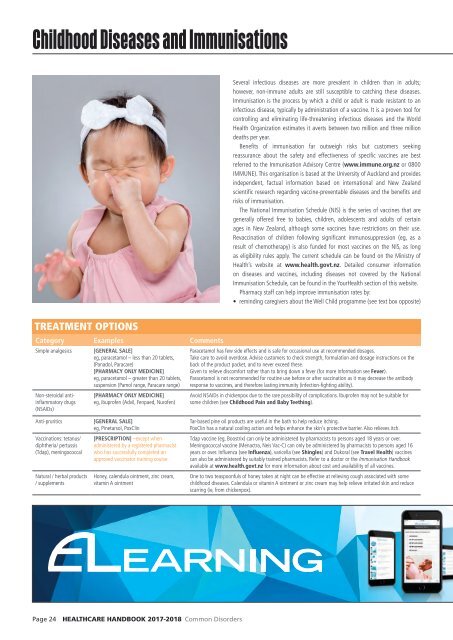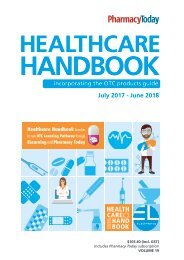2017 HCHB_digital
You also want an ePaper? Increase the reach of your titles
YUMPU automatically turns print PDFs into web optimized ePapers that Google loves.
Childhood Diseases and Immunisations<br />
Several infectious diseases are more prevalent in children than in adults;<br />
however, non-immune adults are still susceptible to catching these diseases.<br />
Immunisation is the process by which a child or adult is made resistant to an<br />
infectious disease, typically by administration of a vaccine. It is a proven tool for<br />
controlling and eliminating life-threatening infectious diseases and the World<br />
Health Organization estimates it averts between two million and three million<br />
deaths per year.<br />
Benefits of immunisation far outweigh risks but customers seeking<br />
reassurance about the safety and effectiveness of specific vaccines are best<br />
referred to the Immunisation Advisory Centre (www.immune.org.nz or 0800<br />
IMMUNE). This organisation is based at the University of Auckland and provides<br />
independent, factual information based on international and New Zealand<br />
scientific research regarding vaccine-preventable diseases and the benefits and<br />
risks of immunisation.<br />
The National Immunisation Schedule (NIS) is the series of vaccines that are<br />
generally offered free to babies, children, adolescents and adults of certain<br />
ages in New Zealand, although some vaccines have restrictions on their use.<br />
Revaccination of children following significant immunosuppression (eg, as a<br />
result of chemotherapy) is also funded for most vaccines on the NIS, as long<br />
as eligibility rules apply. The current schedule can be found on the Ministry of<br />
Health’s website at www.health.govt.nz. Detailed consumer information<br />
on diseases and vaccines, including diseases not covered by the National<br />
Immunisation Schedule, can be found in the YourHealth section of this website.<br />
Pharmacy staff can help improve immunisation rates by:<br />
• reminding caregivers about the Well Child programme (see text box opposite)<br />
TREATMENT OPTIONS<br />
Category Examples Comments<br />
Simple analgesics<br />
Non-steroidal antiinflammatory<br />
drugs<br />
(NSAIDs)<br />
[GENERAL SALE]<br />
eg, paracetamol – less than 20 tablets,<br />
(Panadol, Paracare)<br />
[PHARMACY ONLY MEDICINE]<br />
eg, paracetamol – greater than 20 tablets,<br />
suspension (Pamol range, Paracare range)<br />
[PHARMACY ONLY MEDICINE]<br />
eg, ibuprofen (Advil, Fenpaed, Nurofen)<br />
Paracetamol has few side effects and is safe for occasional use at recommended dosages.<br />
Take care to avoid overdose. Advise customers to check strength, formulation and dosage instructions on the<br />
back of the product packet, and to never exceed these.<br />
Given to relieve discomfort rather than to bring down a fever (for more information see Fever).<br />
Paracetamol is not recommended for routine use before or after vaccination as it may decrease the antibody<br />
response to vaccines, and therefore lasting immunity (infection-fighting ability).<br />
Avoid NSAIDs in chickenpox due to the rare possibility of complications. Ibuprofen may not be suitable for<br />
some children (see Childhood Pain and Baby Teething).<br />
Anti-pruritics<br />
Vaccinations: tetanus/<br />
diphtheria/ pertussis<br />
(Tdap), meningococcal<br />
Natural / herbal products<br />
/ supplements<br />
[GENERAL SALE]<br />
eg, Pinetarsol, PoxClin<br />
[PRESCRIPTION] –except when<br />
administered by a registered pharmacist<br />
who has successfully completed an<br />
approved vaccinator training course<br />
Honey, calendula ointment, zinc cream,<br />
vitamin A ointment<br />
Tar-based pine oil products are useful in the bath to help reduce itching.<br />
PoxClin has a natural cooling action and helps enhance the skin's protective barrier. Also relieves itch.<br />
Tdap vaccine (eg, Boostrix) can only be administered by pharmacists to persons aged 18 years or over.<br />
Meningococcal vaccine (Menactra, Neis Vac-C) can only be administered by pharmacists to persons aged 16<br />
years or over. Influenza (see Influenza), varicella (see Shingles) and Dukoral (see Travel Health) vaccines<br />
can also be administered by suitably trained pharmacists. Refer to a doctor or the Immunisation Handbook<br />
available at www.health.govt.nz for more information about cost and availability of all vaccines.<br />
One to two teaspoonfuls of honey taken at night can be effective at relieving cough associated with some<br />
childhood diseases. Calendula or vitamin A ointment or zinc cream may help relieve irritated skin and reduce<br />
scarring (ie, from chickenpox).<br />
Page 24 HEALTHCARE HANDBOOK <strong>2017</strong>-2018 Common Disorders



